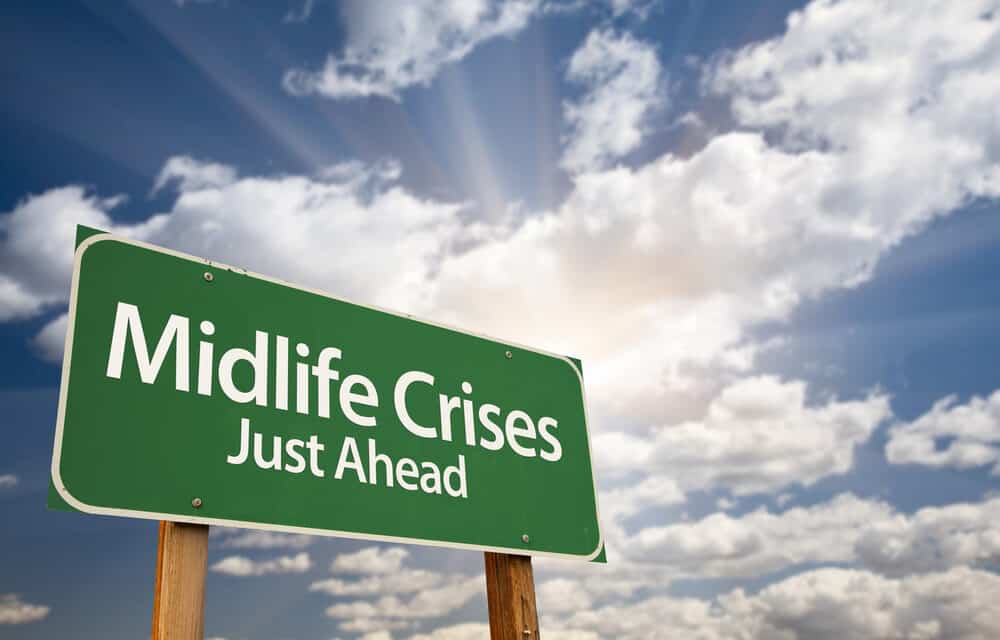Midlife crisis lasts between three to 10 years in men and two to five years in women, and the average length of a midlife crisis is about three years. The midlife crisis age range is usually between 40 and 50 and can be caused by unfulfilled expectations, disillusionment with one’s career, or the loss of a loved one. If you’re experiencing one of these symptoms, you should take a step back and consider what might be going on.
This post explains the causes, signs, and symptoms. I will also explore eight actionable tips for planning for and dealing with, and preventing your midlife crisis, for example, not spending too much money, maintaining healthy relationships, and maintaining a positive outlook. After reading this post, it will be abundantly clear to you that a midlife crisis is an opportunity to reevaluate your life and thrive during middle age and beyond.
Table of Contents
What is a midlife crisis?

Midlife crisis is a term used to describe the period of life when people typically begin to feel the pressures of adulthood. A midlife crisis is when people are most likely to feel lost and start questioning their identity or purpose in life, a feeling of deep unrest and dissatisfaction with one’s life. A midlife crisis is a period of personal upheaval that occurs when people develop an intense interest in the past or re-evaluate their place in society.
In 1308, Dante began his classic work of literature, The Divine Comedy, with the words, “midway upon the journey of my life, I found myself amid a forest dark and gloomy: the track was lost.” He also travels to hell in part one of the Divine Comedy. It is, therefore, clear that the concept of a crisis during a person’s middle age was recognized by humanity in the 12th Century.
The term ‘midlife crisis’ was first defined in 1965 by Dr. Elliott Jacques, a Canadian psychoanalyst. Jacques saw the midlife crisis as a period of psychological breakdown, anguish, depression, and a time to grieve and mourn what has been lost and passed. But even when the breakdown is averted, Jacques concluded that there remain typical patterns of trying to stay young, worrying about health, mortality and appearance, sexual promiscuity to show youth and potency, a sense of hollowness, and lack of real pleasure in life, as well as frequent religious or spiritual worries.
What causes the midlife crisis, and how do we know if it’s real?

A midlife crisis can be caused by various factors, including feeling that you are not living up to your full potential, losing a job, failing health, divorce, or losing a loved one. The most common cause of a midlife crisis is the exhaustion of your personal and professional growth opportunities.
There are also natural hormonal changes that occur during midlife crisis age range between 40 and 50. If you’re a woman, you will experience peri-menopause (the time in the run-up to the last menstruation), which can also cause mood changes. Men also experience hormonal changes (lowering testosterone levels), which play a part in a male midlife crisis. And it is more likely men are affected more by the perceived loss of youth than women because of the lowering of testosterone.
How do you know if you’re in the midst of a midlife crisis?
There are many ways to know if you are in the midst of a midlife crisis. One way is if your partner is younger and has more energy than you do, or if your children are older and have more energy than you do. Another way is if you feel as though every day is a struggle, and life is just a waiting game for the good days to pass. You might also think that you are a burden on your family and friends or that people don’t want to be around you anymore.
Can you tell if someone is having a midlife crisis?
If someone is having a midlife crisis, it could be challenging to identify. However, some signs can help you figure out if someone has one. If the person is experiencing a sudden decrease in their career, they might be having a midlife crisis. If the person is experiencing a sudden change in their personality and suddenly changes from being friendly to aggressive or moody, they might be having a midlife crisis.
Is a midlife crisis real or simply a myth?
Although it is a common misconception, a midlife crisis is actually not a myth. Midlife crises are defined as periods of intense mental and emotional turmoil around 40 to 50. As previously discussed, this period of time is characterized by feelings of anxiety, depression, and confusion. The cause for this mental state is due to a change in life situations which can be caused by the lack of purpose or meaning in one’s life. There are many possible reasons for this change in life situation, which can be any number of things, including the loss of a job, the death of a loved one, or divorce.
What are the signs and symptoms of a midlife crisis?

The midlife crisis can result in various signs and symptoms, including anxiety, depression, anger, and loneliness. Here are [1] some of the common signs of a midlife crisis.
Anxiety and depression
You may feel agitated, restless, sad, and miserable.
Mood swings
You may become highly irritable, temperamental, or angry without any provocation or justification. This can be in addition to mood changes experienced during peri-menopause or a drop in testosterone levels.
Feeling stuck in a rut
You may feel like you are stuck in the wrong job, a bad situation, or even a bad relationship without any way out—the desire to break out of your daily routine.
Oversleeping or sleeplessness
If you have anxiety, depression, and a constantly racing mind, it will significantly affect your sleep. Lack of sleep can affect health in a multitude of ways. You may experience an increase in mood swings or an increase in negative thoughts, and it also increases the risk of diabetes, obesity, and heart disease.
Obsessing with appearances
People going through a midlife crisis have a constant feeling of the need to stay attractive to others. They may go to great lengths to accomplish this.
Increased alcohol or drugs intake
You may be self-medicating with drugs and alcohol to hide your negative emotions. This type of self-help spirals out of control, with devastating effects on your health and well-being.
Thoughts of dying and death
A midlife crisis will cause you to obsess about death and dying. It is also considered when people start thinking about death more deeply and become more aware of their mortality.
Impulsiveness
People going through a midlife crisis adopt impulsive behaviors, including making sudden expensive purchases or sudden decisions such as ending relationships abruptly or going on a spending spree.
Self-doubt
If you feel uncertain about your identity, you may feel like you don’t know yourself or how others perceive you. This self-doubt might cause you to feel like you’re not good enough or that you don’t belong.
Do the signs of a midlife crisis differ between men and women?

Research has shown that gender differences are not significant during a midlife crisis. A man experiencing a crisis may feel that he is no longer attractive; this is the same for women. A woman may feel that her career is stagnant and has failed to live up to its potential; the same applies to a man. Both men and women can turn to excessive drinking, smoking, recreational drugs, or an extravagant spending spree.
What are the stages of a midlife crisis?
There are three stages:
- Anxiety and low self-worth, often after the end of a long-term relationship or being fired from a job
- Restlessness and dissatisfaction with life, leading to reckless behavior
- Confusion and uncertainty about what one should do with their life, which can lead to an existential crisis.
What can you do to avoid or reduce symptoms during your midlife crisis?
The first step is paying attention to your body and what it tells you. This self-awareness may avoid or reduce symptoms during your midlife crisis by paying attention to be an excellent time to talk about the midlife transition with experience a lot of different symptoms. Some are common to everyone, while others are more specific to your case. There are some things that you can do with your doctor. Your doctor will be able to help you figure out what the best course of action is for your specific case.
What can you do to prevent or deal with your midlife crisis?

You can start by looking at some of the psychological theories developed to understand better why people go through a crisis. There are many possible causes, including hormonal changes, biological changes in the brain, and psychological changes. The theories can also help you understand what might be happening if you feel anxious or depressed during your midlife crisis.
If you’re feeling overwhelmed by the changes, you can also take a break from work and focus on something else. You might find that you enjoy spending more time with your family or friends.
Can you prevent a midlife crisis from happening to someone else?

Midlife crisis is an issue that many people face and prevent the potential for someone else to experience this issue. The crisis can be avoided by planning and taking precautions, such as not spending too much money, maintaining healthy relationships, and maintaining a positive outlook.
What happens at the end of your crisis

Your midlife crisis may result in you feeling much more satisfied with your life’s accomplishments and with who you are personally at the conclusion of the experience. As a result, there are a plethora of life possibilities available after a midlife crisis.
Conclusion
A midlife crisis is a period of personal upheaval that occurs when people develop an intense interest in the past or re-evaluate their place in society. It can be caused by unfulfilled expectations, disillusionment with one’s career, or the loss of a loved one. The crisis age range is usually between 40 and 50 and lasts between three to 10 years in men and two to five years in women. The term ‘midlife crisis’ was first defined in 1965 by Dr. Elliott Jacques. A midlife crisis can be caused by various factors, including feeling that you are not living up to your full potential, losing a job, failing health, divorce, or losing a loved one.
It is more likely men are affected more by the perceived loss of youth than women because of the lowering of testosterone. A midlife crisis is defined as periods of intense mental and emotional turmoil around 40 to 50. Midlife crises can result in various signs and symptoms, including anxiety, depression, anger, and loneliness. There are many possible reasons for this change in life situation, which can be any number of things, including the loss of a job or the death of a loved one. People going through a midlife crisis adopt impulsive behaviors, such as making sudden expensive purchases or sudden decisions such as ending relationships abruptly or going on a spending spree.
A midlife crisis is also considered when people start thinking about death more deeply and become more aware of their mortality. There are three stages of the crisis: Anxiety, low self-worth, and dissatisfaction with life, leading to reckless behavior. During a midlife crisis, the first step is paying attention to your body and what it tells you. Your doctor will be able to help you figure out what the best course of action is for your specific case. A midlife crisis can be avoided by planning and taking precautions, such as not spending too much money, maintaining healthy relationships, and maintaining a positive outlook.











